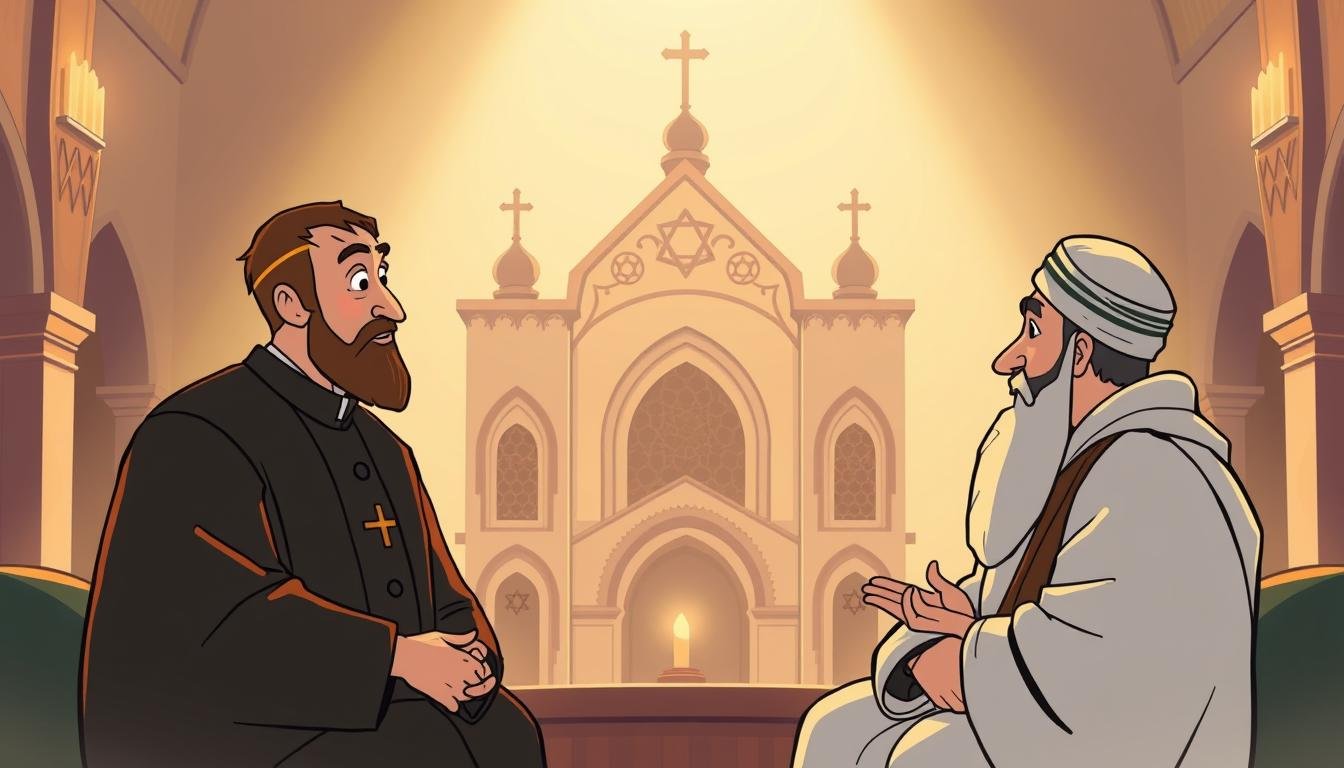Have you ever wondered if you can follow two faiths at once? Millions of people around the world face this question every day. They are drawn to the shared roots of Christianity and Islam but find their beliefs different.
I’ve met people who ask, “Can I be Christian and Muslim?” They are curious but also scared of upsetting either faith. There are 2.3 billion Christians and 1.9 billion Muslims. They both worship under the same skies where Abraham lived.
The word “Allah” in Arabic Bibles shows a deep connection. But, the beliefs about God in Christianity and Islam are very different. How can we honor both without losing their truths?
People want to belong and find unity in their differences. Being Muslim and Christian isn’t just a debate. It’s about a doctor quoting Jesus and a scholar reading the Quran.
Our values, like caring for orphans and fighting injustice, are the same. But, we disagree on how to name God. This article doesn’t give simple answers. It starts a conversation about finding unity in our differences.
Understanding the Question: Can I Be Christian and Muslim?
People often wonder if they can be both Christian and Muslim. They look for more than just labels. This question shows our desire for many beliefs and spiritual peace.
For those in interfaith families or multicultural settings, this question is very personal. The idea of religious syncretism comes up. It’s not about mixing beliefs, but about finding common ground.
“They adore the one God, living and subsisting in himself; merciful and all-powerful, Creator of heaven and earth” (Nostra Aetate, 3).
The Second Vatican Council recognized Muslims’ belief in one God. But, Christianity’s Trinity and Islam’s Tawhid create big differences. Scholars argue if these differences allow for being both Christian and Muslim.
This question is important for 55% of the world’s people. Both Christians and Muslims believe in Jesus. But, the Quran doesn’t accept the Crucifixion, and Christianity believes in the Trinity. How do people deal with these differences?
The answer is not to ignore the differences. It’s about understanding what connects and separates these faiths.
Core Beliefs of Christianity: Essential Tenets
I start by talking about the main beliefs of Christianity. These include the Trinity and salvation. Christianity says God is three persons: Father, Son (Jesus Christ), and Holy Spirit. They are all equal and eternal.
This idea is found in the Nicene Creed. It shows how Christians see salvation. They believe Jesus’ death and resurrection saved us from sin. This is because of Adam’s sin.

“For God so loved the world that he gave his one and only Son, that whoever believes in him shall not perish but have eternal life.” (John 3:16, NIV)
Christian teachings say we are saved by believing in Jesus, not by being good. The Bible, with 66 books, helps us understand these truths. Islam sees Jesus as a prophet but doesn’t believe in the Trinity or Jesus’ divinity.
This creates big differences in beliefs. These core beliefs define what Christianity is. They make us wonder how these beliefs compare to other religions. And what do they mean for our shared values?
These beliefs are connected: without the Trinity, salvation wouldn’t make sense. These beliefs are the foundation of Christianity. They vary among different Christian groups. But all agree on the Trinity and Jesus’ role in saving us.
Fundamental Principles of Islam: Key Pillars
At the heart of Islamic beliefs lies a system where faith and daily life intertwine. These principles, rooted in the Quran and the Prophet Muhammad’s teachings, form a blueprint for spiritual and ethical living. Let’s explore how they shape Muslim identity across cultures.
The Five Pillars of Islam
The Five Pillars of Islam act as the framework for worship and morality. The Shahada—“There is no god but Allah, and Muhammad is His messenger”—is the declaration that begins every Muslim’s journey. Salat, the five daily prayers, aligns believers with Allah’s will through ritualized devotion.
Zakat, requiring 2.5% of surplus wealth, builds community solidarity. Sawm, the Ramadan fast, cultivates self-restraint, while Hajj—the pilgrimage to Mecca—unites millions annually. These pillars aren’t mere rituals; they’re acts of submission to Allah’s divine order.
Islamic Views on Prophet Jesus (Isa)
Jesus (Isa) holds a revered place in Islamic tradition as a prophet and messenger. The Quran calls him the Messiah (al-Maseeh) and acknowledges his miraculous birth and teachings. Yet, Islamic beliefs deny divinity for any created being—Jesus is seen as a human prophet, not part of a Trinity.
This perspective underscored Islam’s strict monotheism, which shapes its theological boundaries.
The Concept of Tawhid (Oneness of God)
Tawhid—the belief in God’s absolute oneness—is the axis around which all Islamic thought revolves. This principle rejects polytheism and deification of any creature. By affirming Tawhid, Muslims align their actions with Allah’s will, ensuring unity between worship and daily life.
It’s this foundation that makes the Five Pillars more than traditions; they’re expressions of surrender to a singular, indivisible divine reality.
Theological Similarities Between Christianity and Islam
Looking into Islam and Christianity shows deep similarities. Both believe in one God, a key point in their teachings. This belief in a single creator is a shared part of their history, coming from Abraham.

Monotheistic Foundations
The Quran says,
“Say, ‘We believe in Allah and what has been revealed to us and what was revealed to Abraham, Ishmael, Isaac, Jacob, and the Descendants, and what was given to Moses, Jesus, and the prophets from their Lord. We make no distinction between any of them”
(Quran 2:136). This belief in one God brings these faiths together. They both reject worship of idols, seeing creation as God’s work alone. This shared belief shows their unity as monotheistic faiths.
Shared Prophetic Figures
Both faiths honor prophets like Abraham, Moses, and Jesus. Muslims see Jesus as a messenger, not God, a view some Christians also hold. They agree on Jesus’ virgin birth, miracles, and return.
Common Ethical and Moral Values
Islam and Christianity share values like justice, kindness, and family. The Quran and Jesus’ teachings both call for good deeds and stopping evil. They also value honesty and helping the needy, showing a common moral path.
Critical Theological Differences That Create Conflict
At the heart of theological differences lies the Trinity doctrine. Christians believe in God as Father, Son, and Holy Spirit. They say God is one essence in three persons. Islam, on the other hand, believes in Tawhid—God’s absolute oneness.
This difference shapes how each faith defines salvation. For Muslims, following Allah’s will through the Five Pillars is key. For Christians, Christ’s sacrifice is central to atonement.
“God created death and life to test you in which of His commands you are best at working.” —Qur’an 67:1-2
Doctrinal conflicts also come from views of Jesus. Christianity sees him as divine and crucified for redemption. Islam, though, sees him as a prophet who did not die on the cross.
These beliefs show different paths to understanding God. Even shared values like charity can’t bridge these divides. The dialogue emphasizes mutual respect but notes that core doctrines can’t be merged.
Creeds like the Nicene Creed show the Trinity, while the Qur’an emphasizes strict monotheism. These differences raise questions about authority. They ask if it’s scripture or tradition, prophet or incarnation.
While respect between faiths grows, these differences mean followers must choose. They must pick a path that matches their view of truth. This honesty in dialogue is better than pretending to be compatible.
Historical Context: Christian-Muslim Relations Through the Ages
Christian-Muslim relations have changed over the years. They have seen both good times and bad. This history shows how cultures have mixed and shared values.
Early Encounters Between Faiths
In the 7th century, Prophet Muhammad met with Christian groups. They talked about their beliefs openly. The Quran says Jesus is a prophet and Mary is very important.
These early talks showed that people from different faiths could live together. Even though they had different beliefs.
Medieval Interactions and Conflicts
In the Islamic Golden Age, Muslim scholars translated Greek texts. This helped science and philosophy grow. Later, European thinkers were influenced by this knowledge.
But, there were also times of war. The Crusades and Ottoman-Venetian wars were examples. Yet, even during these times, people kept trading and learning from each other.
Modern Interfaith Dialogue Movements
Today, there are efforts to improve relations. The 2016 Marrakesh Declaration supports the rights of religious minorities. The 2019 Abu Dhabi Declaration calls for respect between faiths.
These efforts are like what the Quran says. It tells Muslims to treat People of the Book with fairness.
Contemporary Perspectives: What Religious Scholars Say
Today, religious scholars talk a lot about being part of two faiths. Some say we should stick to our beliefs. But others think we should respect each other’s faiths.
The Vatican changed its views in 1965, making talking between faiths easier. But, some big differences are hard to get past.
Views from Christian Theologians
The Catholic Church says Muslims worship the same God. This idea helps start talks between faiths. The USCCB works on these talks, focusing on what we all agree on.
But, there are big debates about Jesus and his teachings.
Perspectives from Islamic Scholars
Islamic thinkers like Isma’il Raji al-Faruqi say Christians have changed Jesus’ message too much. He wrote in Christian Ethics that this change has led to different paths. But, others like Seyyed Hossein Nasr say Islam’s teachings are for everyone.
He believes we can talk about ethics without giving up our beliefs.
Interfaith Dialogue Organizations’ Positions
Groups like the USCCB and the Islamic Society of North America (ISNA) focus on working together on social issues. They say talking between faiths builds trust. But, it’s hard to keep our beliefs strong while getting along with others.
Case Studies: People Who Navigate Both Traditions
In Lebanon, eighteen recognized religious sects live together. The Friendship Network, made of Christian and Muslim leaders, has helped. They’ve given out food and made prayer videos together.
This shows how families in tough times keep their faith. They do this even when Lebanon’s economy is down and Beirut was hit by a big explosion in 2020. Their work shows the struggle between different faiths and helping others.
At Oxford, there’s a Muslim-Christian Summer School. People from different places study together. They look at scriptures like the Qur’an and the Gospels.
One person said studying together changed how they saw shared values. This is important for those who follow two faiths.
But, there are big challenges. In places where sharing faith is hard, keeping your faith can be tough. The UK Christian-Muslim Forum talks about being honest and respecting laws.
David Shenk found that families who follow both faiths often tell the truth. They explain things like baptism to their Muslim relatives. This way, they avoid forcing others to change.
There’s no one way to do it. Some Lebanese families celebrate Eid and Christmas at home. Others join groups to fight for justice.
The Centre for Muslim-Christian Studies in Oxford is all about respectful talks. Scholars there discuss big issues like the role of shari‘ah today. Their work shows that following two faiths is about respect, not mixing beliefs.
FAQ
Can someone be both Christian and Muslim at the same time?
What does religious syncretism mean in the context of Christianity and Islam?
Why do people inquire about following both Christianity and Islam?
What are the Five Pillars of Islam?
How do Christianity and Islam perceive Jesus differently?
What ethical values are shared by Christianity and Islam?
What are the key theological differences preventing dual religious adherence?
How have Christianity and Islam interacted throughout history?
What are contemporary perspectives on dual religious identity from religious scholars?
Can you provide examples of individuals who navigate both Christianity and Islam?

Embracing Faith, One Insight at a Time!
The teachings of the Quran have always guided my path. With a deep passion for Islamic knowledge, I strive to blend the wisdom of tradition with the relevance of today, making the timeless messages of Islam accessible and meaningful for everyone.
Muslim Culture Hub is my platform to share historical insights and thought-provoking articles, exploring both well-known and lesser-discussed aspects of Islamic culture and beliefs. My mission is to create an inclusive online space where everyone can learn, strengthen their faith, and connect with the profound message of Islam.
Join the journey!
May peace be upon you.








